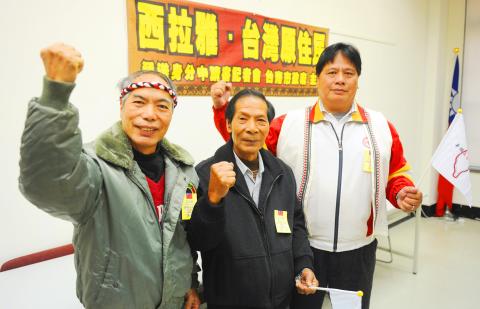Siraya Aboriginal activists, accompanied by Greater Tainan City Mayor William Lai (賴清德) and a number of Democratic Progressive Party (DPP) lawmakers, yesterday called on the government to grant them official tribal recognition.
“We hereby urge the Council of Indigenous Peoples [CIP] to legally recognize the Siraya as an official Aboriginal tribe, in accordance with the Aboriginal Identity Act (原住民族身分法) and the Aboriginal Basic Act (原住民族基本法),” Uma Talavan, spokeswoman for the Tainan Siraya Cultural Association, told a news conference at the Legislative Yuan. “It’s not only about the pride of the Siraya, it would also become a shared historic moment for all Taiwanese.”
The Siraya are an indigenous tribe who used to inhabit the Tainan area.

Photo: Lo Pei-der, Taipei Times
However, the tribe’s culture and language gradually deteriorated after the arrival of Han Chinese from China in the 17th century because of intermarriages and cultural assimilation.
Although the Siraya were still recognized as an official Aboriginal tribe by the Japanese colonial government from 1895 to 1945, it lost recognition following the arrival of the Chinese Nationalist Party (KMT) in 1945.
Responding to the movement for recognition in the past years, the government said the Siraya lost recognition as an Aboriginal tribe because they failed to register as a tribe when urged to do so during the 1950s.
“This is no excuse. Most Siraya people did not receive the notice from the government to register,” Talavan said. “Besides, our identity is something we’re born with. The government cannot simply deny it because we didn’t register in time.”
Cheng-hiong Talavan, father of Uma Talavan, added: “Whatever the government says, we are Aborigines. The government should give us official recognition.”
Lai said he felt frustrated that while his city government works hard to restore Siraya culture and language, “the central government is not doing anything.”
He said the city government not only granted official Aboriginal recognition to the Siraya on the municipal level, it has also given its full support to the restoration of its cultural heritage and language, including adding the Siraya language into the educational curriculum of at least three elementary schools.
“When the Dutch colonists brought over the Latin alphabet in the 17th century, the Siraya created their own Romanized writing system, which is probably the earliest writing system in the country,” he said.
“Forgetting about the Siraya is like forgetting an important part of our history. The central government should show its support for the Siraya movement,” he added.
Shih Cheng-feng (施正鋒), a professor at National Dong Hwa University’s Department of Indigenous Development and Social Works, panned council officials and some critics of the Siraya movement for citing loss of language as a reason for not recognizing the Siraya tribe.
“If you apply the same standards to other officially recognized Aboriginal tribes, I wonder how many of them could pass?” Shih said. “Many older Aborigines speak Japanese, while the younger speak Mandarin Chinese. This is a historic tragedy.”
The activists later delivered an application for Aboriginal recognition to the council after the news conference.

Taiwan is stepping up plans to create self-sufficient supply chains for combat drones and increase foreign orders from the US to counter China’s numerical superiority, a defense official said on Saturday. Commenting on condition of anonymity, the official said the nation’s armed forces are in agreement with US Admiral Samuel Paparo’s assessment that Taiwan’s military must be prepared to turn the nation’s waters into a “hellscape” for the Chinese People’s Liberation Army (PLA). Paparo, the commander of the US Indo-Pacific Command, reiterated the concept during a Congressional hearing in Washington on Wednesday. He first coined the term in a security conference last

Prosecutors today declined to say who was questioned regarding alleged forgery on petitions to recall Democratic Progressive Party (DPP) legislators, after Chinese-language media earlier reported that members of the Chinese Nationalist Party (KMT) Youth League were brought in for questioning. The Ministry of Justice Investigation Bureau confirmed that two people had been questioned, but did not disclose any further information about the ongoing investigation. KMT Youth League members Lee Hsiao-liang (李孝亮) and Liu Szu-yin (劉思吟) — who are leading the effort to recall DPP caucus chief executive Rosalia Wu (吳思瑤) and Legislator Wu Pei-yi (吳沛憶) — both posted on Facebook saying: “I

Sung Chien-liang (宋建樑), who led efforts to recall Democratic Progressive Party (DPP) Legislator Lee Kun-cheng (李坤城), was released on bail of NT$80,000 today amid outcry over his decision to wear a Nazi armband to questioning the night before. Sung arrived at the New Taipei District Prosecutors’ Office for questioning in a recall petition forgery case last night wearing a red armband bearing a swastika, carrying a copy of Adolf Hitler’s Mein Kampf and giving a Nazi salute. Sung left the building at 1:15am without the armband and covering the book with his coat. Lee said today that this is a serious

The Ministry of Economic Affairs has fined Taobao NT$1.2 million (US$36,912) for advertisements that exceed its approved business scope, requiring the Chinese e-commerce platform to make corrections in the first half of this year or its license may be revoked. Lawmakers have called for stricter enforcement of Chinese e-commerce platforms and measures to prevent China from laundering its goods through Taiwan in response to US President Donald Trump’s heavy tariffs on China. The Legislative Yuan’s Finance Committee met today to discuss policies to prevent China from dumping goods in Taiwan, inviting government agencies to report. Democratic Progressive Party Legislator Kuo Kuo-wen (郭國文) said